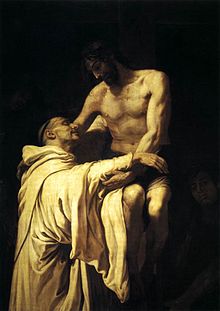On Sunday 20 August 2023 the universal church celebrates the feast of St Bernard of Clairvaux. As Pope Benedict XVI rightly pointed out in his catechesis on the saint, on Wednesday 21 October 2009, The title Doctor Mellifluus, attributed to Bernard by tradition, stems precisely from this; indeed, his praise of Jesus Christ “flowed like honey”.
When I look deeper into his holy life I notice that Bernard’s words and actions were full of Jesus Christ. Suffice to mention his admirable and passionate dedication for the faith which served as an excellent vocational promotion to convince his brothers as well as his uncle to join him at the abbey. Moreover, Bernard’s life was an exemplary way of harmonizing both the contemplative and the apostolic life. Such a peaceful blending was an immense blessing for us to see in St Bernard that ardent love on the greatest truth that God, who is love, created us human beings driven by His love for us. Those who were open to God’s voice through Bernard realized that their salvation depended on collaborating steadily to that Divine love amazingly manifested through the passion, death and resurrection of Christ.
Furthermore, and as Pope Benedict explained in his Angelus address on Sunday, 20 August 2006 at Castel Gandolfo, The riches and merits of his theology do not lie in having taken new paths, but rather in being able to propose the truths of the faith in a style so clear and incisive that it fascinated those listening and prepared their souls for recollection and prayer.The same can be said of his reflection on Mary. His deep Mariological mediation on the Mother of God and Our Mother helps us to look at Mary as the Star which leads us to where Jesus is. Hence, Pope Benedict said: In one of his famous discourses, St Bernard compares Mary to the Star that navigators seek so as not to lose their course: “Whoever you are who perceive yourself during this mortal existence to be drifting in treacherous waters at the mercy of the winds and the waves rather than walking on firm ground, turn your eyes not away from the splendour of this guiding star, unless you wish to be submerged by the storm!… Look at the star, call upon Mary…. With her for a guide, you will never go astray; …under her protection, you have nothing to fear; if she walks before you, you will not grow weary; if she shows you favour you will reach the goal (Hom. Super Missus Est, II, 17). In simple words, St Bernard’s unique contribution is that he presented to us Mary as the model for both consecrated life and the Christian life in general. On this point, Pope Benedict XVI said during the general audience of Wednesday, 20 August 2008: He was also described as a “Marian Doctor”. This was not because he wrote so much on Our Lady but because he knew how to grasp her essential role in the Church, presenting her as the perfect model of monastic life and of every other form of Christian life.
In his encyclical on St Bernard of Clairvaux, Pope Pius XII extolled the saint’s holy life, discernment and wisdom when he said: The “Doctor Mellifluus,” “the last of the Fathers, but certainly not inferior to the earlier ones,”[1] was remarkable for such qualities of nature and of mind, and so enriched by God with heavenly gifts, that in the changing and often stormy times in which he lived, he seemed to dominate by his holiness, wisdom, and most prudent counsel (no.1). Adding to this Pius XII reminded us of St Bernard’s inclination to prayer and contemplation when he stated: The “Doctor Mellifluus” makes his way with care deliberately through the uncertain and unsafe winding paths of reasoning, not trusting in the keenness of his own mind nor depending upon the tedious and artful syllogisms which many of the dialecticians of his time often abused. No! Like an eagle, longing to fix his eyes on the sun, he presses on in swift flight to the summit of truth (no 6).
Within an environment wherein spiritual indifference was on the increase, as certainly is in our own times, Pope Pius XII proposed the writings of St Bernard as a life-giving force that aspire us to lift [our] eyes and minds to Heaven [and long for] heavenly things and the goods that are everlasting (no.12). He said: Wherefore, since love for God is gradually growing cold today in the hearts of many, or is even completely quenched, We feel that these writings of the “Doctor Mellifluus” should be carefully pondered; because from their content, which in fact is taken from the Gospels, a new and heavenly strength can flow both into individual and on into social life, to give moral guidance, bring it into line with Christian precepts, and thus be able to provide timely remedies for the many grave ills which afflict mankind (no. 14).
Let us, with St Bernard, whose life and words flowed like the honey of Christ, call Mary to accompany us in our path of holiness as She certainly accompanied today’s saint.
Run, hasten, O Lady,
and in your mercy help your sinful servant,
who calls upon you,
and deliver them from the hands of the enemy.
Who will not sigh to you?
We sigh with love and grief,
for we are oppressed on every side.
How can we do other than sigh to you,
O solace of the miserable,
refuge of outcasts,
ransom of captives?
We are certain that when you see our miseries,
your compassion will hasten to relieve us.
O our Sovereign Lady and our Advocate,
commend us to your Son.
Grant, O blessed one,
by the grace which you have merited,
that he who through you
was graciously pleased to become a partaker
of our infirmity and misery,
may also through your intercession,
make us partakers of his happiness and glory. Amen.

